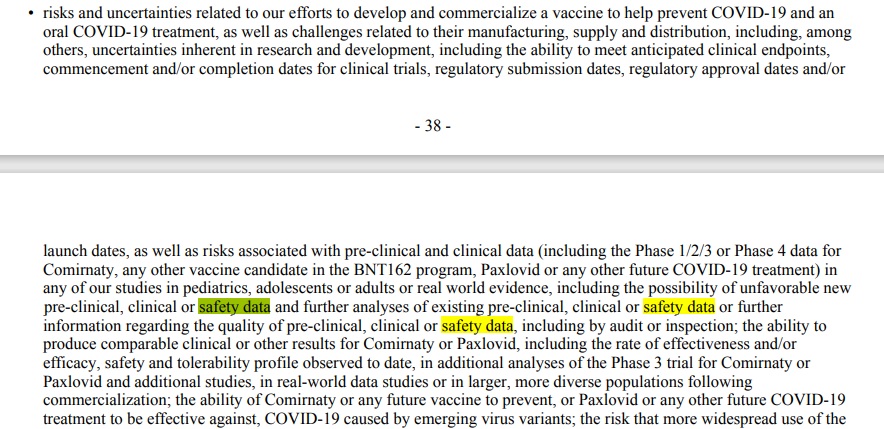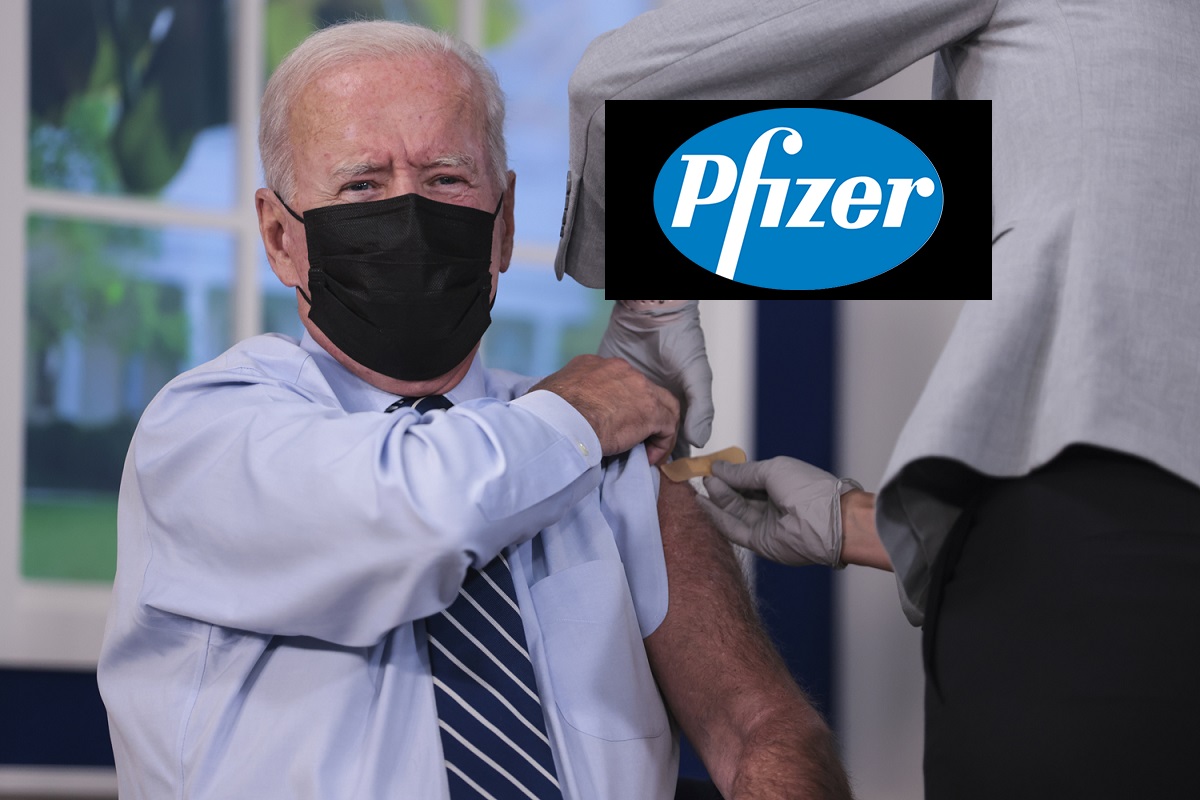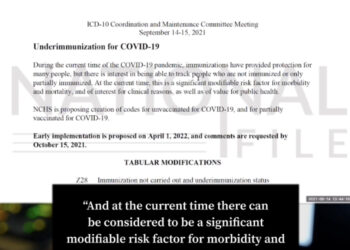Last Updated on February 13, 2022
In February 2022, Pfizer published its fourth-quarter 2021 earnings report for shareholders with some very disturbing “redline changes” to the text. The current version confirms that Pfizer faces serious risk stemming from the “possibility of unfavorable new pre-clinical, clinical or safety data” for the company’s Coronavirus-themed products including the Pfizer-BioNTech Coronavirus vaccine. The Pfizer fourth-quarter earnings report also notes “the risk of additional adverse reactions, some of which may be serious” and complains about “challenges related to public confidence or awareness of our COVID-19 vaccine or Paxlovid, including challenges driven by misinformation.” Pfizer’s report notes the possibility of “an adverse decision or settlement.” Remarkably, Pfizer also remarks upon “the possibility that COVID-19 will diminish in severity or prevalence, or disappear entirely…”
This is a major development considering that the FDA scheduled a meeting to discuss authorizing the Pfizer-BioNTech vaccine for children as young as six months old, but then postponed the meeting after “new data” emerged in clinical trials. The FDA knew about numerous adverse events for children related to the Pfizer-BioNTech Coronavirus vaccine but approved it anyway for children as young as five years old. The university that hosts and directly funds Joe Biden’s think tank profits off the sale of Pfizer-BioNTech vaccines and also profits off FDA approval of Pfizer-BioNTech vaccines, which is a major conflict of interest for Joe Biden.
“This earnings release and the related attachments contain forward-looking statements about, among other topics, our anticipated operating and financial performance…our efforts to respond to COVID-19, including the Pfizer-BioNTech COVID-19 vaccine (Comirnaty) and our oral COVID-19 treatment (Paxlovid); and our expectations regarding the impact of COVID-19 on our business, operations and financial results that involve substantial risks and uncertainties,” PFIZER STATED IN ITS EARNINGS RELEASE, WHICH CAN BE ACCESSED HERE.
Pfizer’s report details the “Risks” that the company now faces including (emphasis added): “the possibility of unfavorable pre-clinical and clinical trial results, including the possibility of unfavorable new pre-clinical or clinical data and further analyses of existing pre-clinical or clinical data; the risk that pre-clinical and clinical trial data are subject to differing interpretations and assessments, including during the peer review/publication process, in the scientific community generally, and by regulatory authorities…our ability to successfully address comments received from regulatory authorities such as the FDA or the EMA, or obtain approval for new products and indications from regulators on a timely basis or at all; regulatory decisions impacting labeling, including the scope of indicated patient populations, product dosage, manufacturing processes, safety and/or other matters, including decisions relating to emerging developments regarding potential product impurities; the impact of recommendations by technical or advisory committees; and the timing of pricing approvals and product launches; claims and concerns that may arise regarding the safety or efficacy of in-line products and product candidates, including claims and concerns that may arise from the outcome of post-approval clinical trials, which could impact marketing approval, product labeling, and/or availability or commercial potential…”
Pfizer describes the “risks and uncertainties related to our efforts to develop and commercialize a vaccine to help prevent COVID-19 and an oral COVID-19 treatment, as well as challenges related to their manufacturing, supply and distribution, including, among others, uncertainties inherent in research and development, including the ability to meet anticipated clinical endpoints, commencement and/or completion dates for clinical trials, regulatory submission dates, regulatory approval dates and/or launch dates, as well as risks associated with pre-clinical and clinical data (including the Phase 1/2/3 or Phase 4 data for Comirnaty, any other vaccine candidate in the BNT162 program, Paxlovid or any other future COVID-19 treatment) in any of our studies in pediatrics, adolescents or adults or real world evidence, including the possibility of unfavorable new pre-clinical, clinical or safety data and further analyses of existing pre-clinical, clinical or safety data or further information regarding the quality of pre-clinical, clinical or safety data, including by audit or inspection; the ability to produce comparable clinical or other results for Comirnaty or Paxlovid, including the rate of effectiveness and/or efficacy, safety and tolerability profile observed to date, in additional analyses of the Phase 3 trial for Comirnaty or Paxlovid and additional studies, in real-world data studies or in larger, more diverse populations following commercialization; the ability of Comirnaty or any future vaccine to prevent, or Paxlovid or any other future COVID-19 treatment to be effective against, COVID-19 caused by emerging virus variants; the risk that more widespread use of the vaccine or Paxlovid will lead to new information about efficacy, safety or other developments, including the risk of additional adverse reactions, some of which may be serious; the risk that pre-clinical and clinical trial data are subject to differing interpretations and assessments, including during the peer review/publication process, in the scientific community generally, and by regulatory authorities…”

Pfizer discusses “the possibility that COVID-19 will diminish in severity or prevalence, or disappear entirely; risks related to the availability of raw materials to manufacture or test any such products; challenges related to our vaccine’s formulation, dosing schedule and attendant storage, distribution and administration requirements, including risks related to storage and handling after delivery by Pfizer…
Pfizer complains about the “challenges related to public confidence or awareness of our COVID-19 vaccine or Paxlovid, including challenges driven by misinformation, access, concerns about clinical data integrity and prescriber and pharmacy education; trade restrictions; potential third-party royalties related to our COVID-19 vaccine or Paxlovid; and competitive developments;…any changes in business, political and economic conditions due to actual or threatened terrorist activity, civil unrest or military action;…legal defense costs, insurance expenses, settlement costs and contingencies, including those related to actual or alleged environmental contamination; the risk and impact of an adverse decision or settlement and the adequacy of reserves related to legal proceedings;…In addition, clinical trial data are subject to differing interpretations, and, even when we view data as sufficient to support the safety and/or effectiveness of a product candidate or a new indication for an in-line product, regulatory authorities may not share our views and may require additional data or may deny approval altogether…”
















